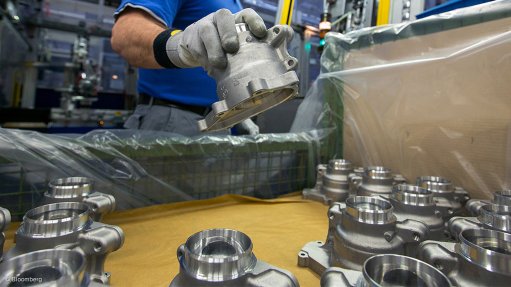
NACAAM and other stakeholders are aiming to increase localisation of the components industry
Photo by: Bloomberg
The National Association of Automotive Component and Allied Manufacturers (NAACAM), in partnership with the International Finance Corporation (IFC), has launched and demonstrated the Localisation Optimisation Opportunity Platform (LOOP), a ‘matchmaking’ platform developed by the two entities to meet the procurement needs of original-equipment manufacturers (OEMs) and tier-one component suppliers.
Through the platform, OEMs and tier-one suppliers can be matched with the capabilities of lower-tier, emerging suppliers in an effort to drive localisation.
The LOOP launch took place during the first day of the NAACAM Show 2023 conference and exhibition, which was held over two days this week in Pretoria.
NAACAM and the IFC in 2022 entered into a partnership agreement to start development of the platform. Development began shortly after, with assistance from NAACAM member KPMG, NAACAM executive director Renai Moothilal said at the launch.
He pointed out that the objective of LOOP was to develop an automotive database to match the procurement needs of tier-one component manufacturers and subtier local suppliers, with the aim of deepening localisation across tier-two and lower spaces.
Further to supporting and driving deeper localisation, LOOP is also aimed at meeting the transformation imperatives as outlined in the South African Automotive Master Plan 2035, Moothilal said.
He noted that LOOP would also be able to provide up-to-date information on company capabilities, scorecard levels, and other indicators that are required for procurement.
Moothilal said LOOP provided an automated matching capability to highlight localisation opportunities to potential suppliers and buyers in their value chains.
It was hoped that LOOP could provide a mechanism to match the needs of local suppliers with those of their customers, and to do so seamlessly, thereby facilitating greater access to local suppliers, he averred.
LOCALISATION IMPORTANCE
Underlining the need to bolster localisation Finance Deputy Minister Dr David Masondo told delegates attending the NAACAM Show 2023 that localisation levels in the country had been weak for several years and were currently at about 38%.
Competitor economies such as Thailand, Turkey and Mexico had localisation levels of about 60% or higher, he pointed out.
“The ambition to reach 60% localisation rates by 2035, under the South African Automotive Masterplan 2035, is crucial to realising the economic benefits the government expects out of the support it gives the automotive sector,” Masondo emphasised.
He averred that achieving the 60% localisation target was important to turn the tide against de-industrialisation that the country had experienced in the last two decades.
“The South African automotive industry is a valued part of South Africa’s domestic economy, but there are increasing questions on whether its full value is being unlocked. The only way to justify the government’s fiscal support to the sector is through greater localisation and more component production opportunities,” Masondo said.
Trade, Industry and Competition Minister Ebrahim Patel, meanwhile, told delegates that the Automotive Production and Development Plan target for 2035 was aimed at ensuring the creation of about 500 second- and third-tier South African suppliers, of which 25%, or 130, were expected to be black-owned, off a very low base currently.
“We’ve got to work very hard with each other to try to achieve this. Our work is cut out to deliver these targets. NAACAM has been a very active partner to OEMs and to government in this journey of localising most of the elements of the vehicles we drive,” Patel highlighted.
He added that the more the country localised, and the more complex components it could bring into the local supply chain, the greater the value that was captured in the local economy would be.
Moreover, Patel averred that, with the industry changing more rapidly than ever before, with new-energy vehicles and unprecedented technology advancements, the focus for South Africa in this new environment should be on strengthening second- and third-tier suppliers to introduce more local capacity and participation by local firms into the value chain.